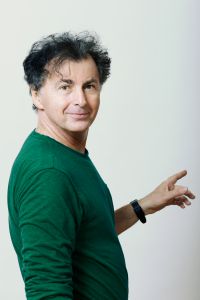“The body already does a lot of things right on its own; the training that we do here acts as a ‘helping hand’,” says Aleksandar Acev, who’s been a professor of basic physical training and physical theatre at the Max Reinhardt Seminar since this October. Acev helps students learn to perceive their own bodily motions as means of portrayal. “It’s about embodying ‘something’: emotions, feelings, memories, perceptions, thoughts, imagination,” he explains. Acev’s central goal is for the students to develop their own motion-repertoires in order to realise the physical dimension of a given role or character. “In my teaching, the focus is on learning about space, movement’s articulation and musicality, types of movement, and gestures. One sometimes sees these things expressed in thoroughly everyday activities: standing, walking, sitting, falling, handshakes, stone-throwing, etc. It doesn’t always have to be something spectacular,” explains Acev. His teaching is based very strongly on practical exercises: “I’ll put my hand on someone’s shoulder, for example. I’ll repeat that several times—once while looking into their face, then while looking at their body, then over their head, past their head on one side, at the audience, into the sky, at the floor, at my body, etc. I keep putting my hand on their shoulder, but my gaze generates ever-new meanings or possible interpretations. And if I also change the dynamic of the gesture itself, my breathing, or the tension in my hand, that gives rise to still other nuances and meanings with an effect on the other person, on the audience, and on myself. Even more important than my original action is the reaction to it! And these two motions are enough to tell a little story.”

Getting students (re)acquainted with themselves and their own motions is a central element of Acev’s teaching—as part of which he seeks to have them put aside their expectations and possible pre-existing opinions. Students looking for a “user’s manual” for their bodies and physical motion here will be disappointed: “The training we do is a voyage of discovery where the acting students collect experiences and sort them out. Oftentimes, this process gives rise to more questions than answers,” he says. And what’s interesting here is less what one can do than what one can’t. On this, Acev adds the following: “The phase in which you discover your own areas of incompetence can sometimes be very unpleasant. Physical training is an artistic process that leads from the discovery of unconscious incompetence to conscious incompetence and, father down the road, from conscious competence to unconscious competence.”
Working with and learning about the body and bodily motion is important for acting students in terms of their ability to manifest authentic expressions. “If a motion’s genesis and execution are based more on your own decision or instinct than on a given form, then that motion has a greater chance at seeming authentic,” explains Acev. This type of training, therefore, attempts to help students liberate themselves from motion-related habits and patterns.
The range of artistic training pursued by Aleksandar Acev himself was broad indeed. Alongside his studies at the Croatian National Ballet in Zagreb, he also took lessons in contemporary dance and “modern mime”. He eventually abandoned his career in ballet in favour of performing all over ex-Yugoslavia as a mime—as which he ended up becoming known to a broad audience thanks to numerous appearances on Croatian television. His activities soon took him farther afield: “I had the privilege of appearing in 20 countries as an artist, and the resulting cultural exchange with the unfamiliar and unknown had a big effect on me,” he remembers. His work as a performer was eventually joined by directing and, later on, the desire to teach. “What’s developed, gradually and organically, have been three prongs of activity, with my performing nourishing my directing, directing enriching teaching, and teaching feeding back into my choreographies.” Acev’s career has repeatedly taken him to unusual theatrical venues—like a prison in Berlin, where he once prepared a dramatic work with inmates as the performers. “Theatre in atypical places has a tendency to turn up ‘unusual bodies’—bodies that defy conventions,” says Acev. And it’s in this light that he also views his teaching work at the Max Reinhardt Seminar: “It’s not just about having the students here grow into high-performing personalities for the film and theatre market; what I’m particularly interested in doing is helping support acting and directing students’ own creative freedom, inner maturity, self-reliance, and independence. Some aspect of the rebellious body has to remain.”

